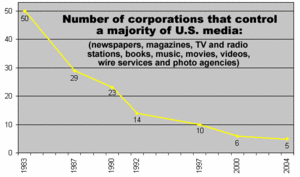Difference between revisions of "Media consolidation"
(→Overview: more explanation about how this leads to centralized control) |
(→Overview: graph) |
||
| Line 1: | Line 1: | ||
==Overview== | ==Overview== | ||
| + | [[File:Media-ownership-2004.gif|thumb|300px|Number of corporations controlling the [[mainstream media|majority of US media]], 1983-2004]] | ||
[[category:United States issues]][[Media consolidation]] refers to an ongoing process in which more and more media companies (e.g. radio, television, newspapers, magazines) are falling into the hands of fewer and fewer owners. | [[category:United States issues]][[Media consolidation]] refers to an ongoing process in which more and more media companies (e.g. radio, television, newspapers, magazines) are falling into the hands of fewer and fewer owners. | ||
Revision as of 14:20, 31 July 2009
Overview

Media consolidation refers to an ongoing process in which more and more media companies (e.g. radio, television, newspapers, magazines) are falling into the hands of fewer and fewer owners.
These owners can then increasingly frame and direct the national discourse (or what passes for it, these days) in such a way as to control what a majority of voters believe. This gives them subtle but nonetheless enormous power to control the national mindset and government, by determining what issues get "airplay" (and how they are presented) and which candidates win elections.
It is primarily an issue in the United States, where there are no government-owned media companies to provide a voice that is not driven by any requirement to maximize profit or donations.
Related Issues
- The new webcasting rules in the United States will be another step towards media consolidation if not repealed, as only large companies can afford to operate internet radio stations under the new rules.
Links
Filed Links
- redirect template:links/smw